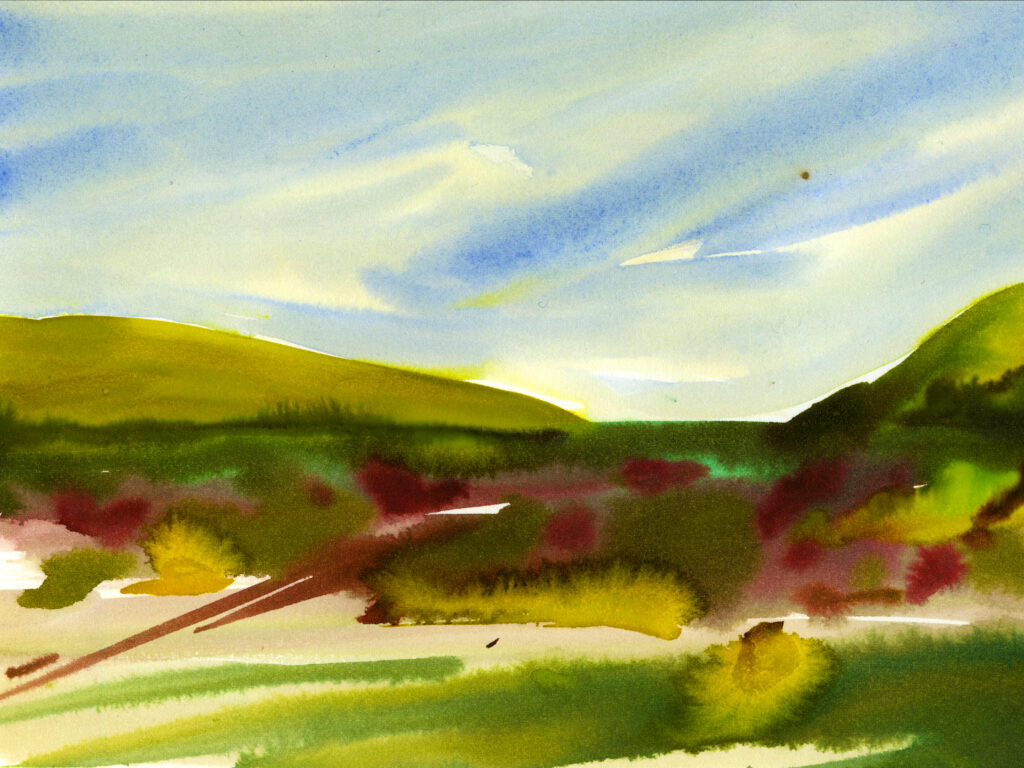The Blackstairs Mountains

Illustration by Na Kim.
In the new Winter issue of The Paris Review, Belinda McKeon interviews the writer Colm Tóibín, author of ten novels, two books of short stories, and several collections of essays and journalism. Tóibín also writes poetry—“When I was twelve,” he tells McKeon, “I started writing poems every day, every evening. Not only that but I followed poetry as somebody else of that age might follow sport”—and we are pleased to publish one of his recent poems here.
The Morris Minor cautiously took the turns
And, behind us, the Morris 1000, driven by my aunt,
Who never really learned to work a clutch.
I remember the bleakness, the sheer rise,
As though the incline had been
Cut precisely and then polished clean,
And also the whistle of the wind
As I grudgingly climbed Mount Leinster.
All of us, in fact, trudged most of the way up,
With my uncle carrying a pair
Of binoculars borrowed from Peter Hayes
Who owned a pub in Court Street.
My uncle surveyed the scene
As far as Carlow with the binoculars,
And up toward the Wicklow Mountains.
And my father, when he was handed them,
Claimed that he could actually see the sea.
But, when it was my turn, all I saw
Was something vague in the distance
That no amount of focusing
Could convince me were foam or waves.
So much chatter and excitement,
My mother wearing slacks and a headscarf
And Auntie Kathleen her sensible shoes,
So much distraction that my uncle did not realize
Until we reached the cars
That he must have left the binocular case
Somewhere, maybe when we stopped
Near Black Rock Mountain on the way down.
The adults all looked worried.
How could they face Peter Hayes, or face
His wife and his sister who helped
Him run the bar, with the news?
Then my brother Brendan said
That he would go back and see
If he could find the case, but my aunt
Was even more against the plan
Than my mother. It would take an hour
To get up and half an hour to get down.
And that was if he ran all the way.
But he looked for approval to my father
And my uncle. He would be quick, he said.
And, so, he set out to bring back the case.
Soon, he was a speck, and then smaller
Until not even the binoculars could find him.
There was worry that a mist could descend,
But it stayed bright, uncloudy. It was one
Of those long July Sundays. We waited.
I don’t know what we talked about
Or what we did. Time passed, I suppose.
All of us worried that he wouldn’t find
The case after all the trouble,
That he would look everywhere
But eventually appear empty-handed.
The adults always had something to discuss.
My father and his brother could talk history
Or hurling or tell stories about old priests.
My mother and her sister-in-law
Could ask the girls about school, the nuns.
And I could watch them. I do that to this day.
But none of us mattered
Against the one who had left us,
Who was still out of sight.
When he returned, pale-faced, silent,
With the case in his hand, he was greeted
By my uncle with a ten-shilling note.
He had found the case where my uncle thought
It had been left: on that wall at the lookout point
A bit below Black Rock Mountain.
As we drove south in our convoy of two
Small cars, no one thought of anything more
Than the night ahead, the day to come.
No one imagined another Sunday, years hence:
He has been found dead, your brother.
You should get a flight home
As soon as you can. In the time the taxi snakes
Toward the airport, and the next day
When I see him in his coffin,
I think of that journey up the mountain,
The single intent, and I imagine my brother
Searching once again for the leather case,
Not seeing it there on that wall, and then looking
All around, defeated, knowing that his climb
On this occasion has not worked out,
And I want him to be assured by someone:
There is nothing to worry about,
Things have changed, most of those awaiting
You are dead: Auntie Kathleen and Uncle Pat,
Harriet and Maeve, our mother and father,
And Niall too. Even Peter Hayes, his wife and sister.
No one will be disappointed.
The binocular case can linger where it will.
Even the binoculars themselves are beyond use.
It is better to take your ease, lie down
In the scarce grass, wait a while,
Close your eyes when night falls, dream
Of what can be seen through a convex lens:
The Barrow, the Slaney, sharp lines
In the landscape, a blur that might be Carlow town,
And fields, folding out for miles,
And then, to the east, what must be the coast,
The soft waves at Cush, the long strand at Curracloe,
But really just what I saw that day through
Those binoculars: something vague in the distance,
A dimness receding, first shimmering, then still.
Colm Tóibín’s most recent book is The Magician.
Copyright
© The Paris Review
